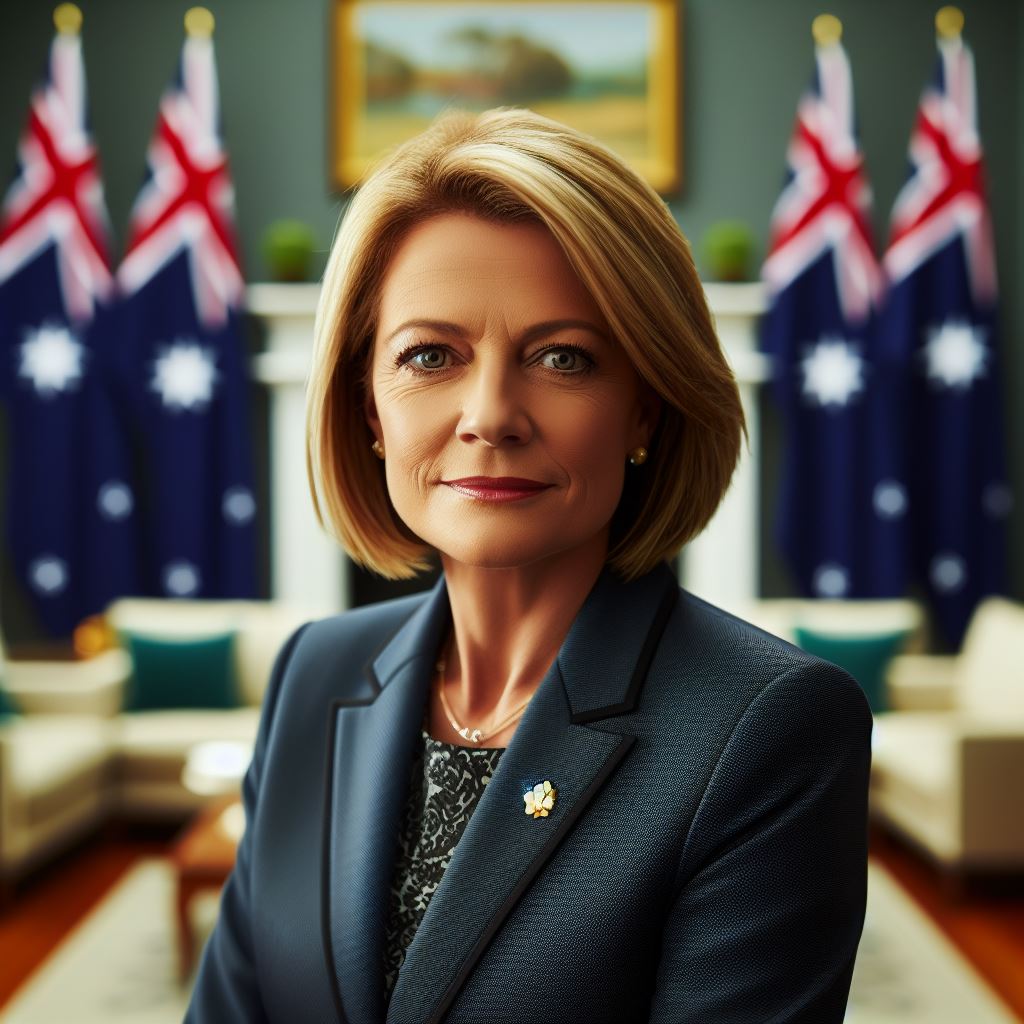Introduction
The transformation of women’s role in Australian politics is a captivating narrative that unfolds against the backdrop of societal evolution.
As we venture into the dynamic realm of Australian politics, the increasing representation of women emerges as a significant and transformative force.
Over the years, there has been a noteworthy shift, marking a departure from the traditionally male-dominated political scene.
The landscape is changing, and women are making remarkable strides, occupying key positions and influencing policy decisions.
This shift is not merely numerical; it represents a qualitative change in perspectives and priorities.
The significance of this evolution lies in its potential to reshape the political discourse, bringing in a diversity of voices and experiences.
This surge in women’s participation is not just symbolic; it has tangible effects on policies and governance.
The impact is far-reaching, influencing issues ranging from social welfare to economic strategies.
As we embark on this exploration, it becomes evident that the changing role of women in politics is not only a reflection of societal progress but also a catalyst for broader positive transformations within the Australian political landscape.
Historical Perspective
Historical underrepresentation of women in Australian politics
In the realm of Australian politics, women have historically faced a glaring underrepresentation, with their voices often drowned out or ignored.
This vast gender disparity can be attributed to various factors, including deeply entrenched societal norms and systemic barriers.
However, the journey towards achieving gender equality in politics has been marked by several significant milestones, each contributing to a slow but steady change in the Australian political landscape.
Key milestones and significant events in the journey towards gender equality in politics
One crucial event in this progression was the formation of the Women’s Political Association (WPA) in 1902, which aimed to advocate for women’s rights and political representation.
The establishment of the WPA provided a platform for women to voice their concerns and actively engage in political discussions.
Another landmark moment occurred in 1921, with the appointment of Edith Cowan as the first female member of an Australian parliament.
Cowan’s election to the Western Australian Legislative Assembly was a groundbreaking achievement, shattering the gender barrier within the realm of politics.
Following Cowen’s historic milestone, Enid Lyons became the first woman elected to the House of Representatives in the Australian Federal Parliament in 1943.
This achievement paved the way for future generations of women to aspire to political leadership roles.
The first women to hold political positions in Australia
Despite these early breakthroughs, it took until 1966 for Ivy Wedgwood to become the first woman appointed as a senator, reinforcing the significant challenges women faced in entering the political arena.
The inclusion of women in upper levels of government was a significant step forward towards gender equality.
The struggle for gender equality in politics was further fueled by seminal events like the election of Joan Child as the first female Speaker in the House of Representatives in 1986.
This historic moment challenged the prevailing gender norms within parliamentary structures.
Another pivotal milestone occurred in 2007, when Julia Gillard became the first female Deputy Prime Minister of Australia.
Gillard’s ascension to this high-ranking position was a moment of pride for many women and served as a beacon of hope for a more equitable future.
As the years have gone by, the Australian political landscape has witnessed a gradual increase in the number of women holding significant positions.
In 2010, Julia Gillard made history once again, becoming Australia’s first female Prime Minister.
Despite these groundbreaking achievements, gender equality remains an ongoing battle in Australian politics.
Women continue to face unique obstacles and biases, hindering their full participation and rise to power in government.
In short, Australian politics has experienced a long and arduous journey towards achieving gender equality.
Significant strides have been made, with women breaking barriers and holding positions previously reserved exclusively for men.
Nevertheless, continued efforts are necessary to dismantle the remaining hurdles and foster a truly inclusive political landscape for all.
Read: Understanding Public Sector Unions
Current Status of Women in Australian Politics
Present statistics and data on the representation of women in various political positions
- Only 32% of representatives in the Australian parliament are women.
- Women make up just 36% of members in the Australian Senate.
- In the House of Representatives, women hold only 31% of the seats.
- The Australian Greens have the highest proportion of female representatives, with 47%.
- The Liberal Party has the lowest representation of women, with only 22%.
- Labor Party has 45% female representation, showing a significant increase over the years.
Gender Disparities in Australian Politics
Despite some progress, gender disparities persist in Australian politics, with low women representation in leadership roles.
Female politicians encounter a pay gap and limited access to resources, hindering their campaigns.
Media coverage focuses more on their appearance than their achievements.
Certain political party cultures perpetuate male dominance, impeding women’s progress.
Stereotypes and biases affect women’s credibility and electability, while the demanding nature of political roles challenges work-life balance.
Retention is a concern, leading to a lack of experienced female representatives.
Addressing these disparities is crucial, and initiatives can play a pivotal role in achieving gender equality.
Political parties should implement quotas to ensure a minimum percentage of female candidates.
Equal pay for politicians, regardless of gender, is essential to narrow the existing pay gap.
Providing financial and campaign support levels the playing field.
Encouraging fair and unbiased media coverage of female politicians is crucial.
Changing party culture to promote inclusivity and diversity breaks down barriers faced by women.
Educational campaigns raising awareness about women’s representation challenge stereotypes.
Offering flexible working options supports women in balancing political and personal lives.
Establishing mentoring programs and support networks guides aspiring female politicians.
By addressing these gender disparities and implementing relevant strategies, Australian politics can achieve equitable representation.
Increased female participation brings diverse perspectives, inspiring future generations of women in politics.
Ultimately, achieving gender equality in politics is a shared responsibility for a more inclusive and representative democratic landscape.
Read: Benefits of a Career in Public Service
Challenges Faced by Women in Politics
The unique challenges faced by women in the political sphere, such as sexism and gender bias
Women in politics face a range of unique challenges that hinder their progress and success.
Sexism and gender bias are prevalent in the political sphere, making it difficult for women to navigate and thrive in this male-dominated field.
These challenges arise from gendered expectations, role perceptions, and stereotypes that society holds about women’s capabilities and roles.
One of the main challenges faced by women in politics is sexism.
Female politicians often face derogatory comments, online abuse, and belittlement that their male counterparts do not experience.
Such sexism undermines the confidence and credibility of women politicians and perpetuates stereotypes that women are not fit for leadership positions.
The impact of gendered expectations, role perceptions, and stereotypes on women politicians
Gender bias also hinders the progress of women in politics.
Women face discrimination when it comes to party nominations and funding for their campaigns.
Male politicians are often favored over their female counterparts, making it harder for women to access the resources necessary for a successful political career.
Additionally, gendered expectations play a significant role in limiting women’s political opportunities.
Society often assigns women the role of caretakers and nurturers, which clashes with the perception of strong and assertive leadership required in politics.
These expectations create a double standard where women have to prove themselves more than men to be considered capable leaders.
Stereotypes about women politicians also inhibit their success.
Women are often portrayed as emotional, weak, and lacking decisiveness in the media, which affects public perception.
These stereotypes can limit the support and trust that voters have in women politicians, making it harder for them to gain political power.
Examples of gender discrimination or unfair treatment experienced by women in politics
Many examples of gender discrimination and unfair treatment have been witnessed in the political sphere.
Female politicians are often subjected to invasive and demeaning questions about their appearance, personal lives, and marital status.
Their qualifications and experience are sometimes overshadowed by irrelevant and superficial aspects of their identity.
Another form of gender discrimination is the underrepresentation of women in leadership positions.
Despite women constituting more than half the population, they are significantly outnumbered in parliaments and cabinets.
This lack of representation denies women their rightful voice in decision-making processes and perpetuates a male-centric view of politics.
The media also plays a role in perpetuating sexist narratives against women in politics.
Female politicians are often subject to harsher scrutiny and criticism compared to their male counterparts.
The focus on their appearance, tone of voice, and personal lives distracts from their policy proposals and achievements, creating an uneven playing field.
All in all, women in politics face a wide range of challenges that impede their path to success.
Sexism, gender bias, gendered expectations, and stereotypes all contribute to the obstacles women encounter.
By recognizing and addressing these challenges, society can work towards creating a more inclusive political sphere where women have an equal opportunity to participate and lead.
Read: Retirement Plans for Public Sector Workers

Changing Dynamics and Increasing Representation
In recent years, there has been a significant shift in the representation of women in Australian politics.
Several factors have contributed to this ongoing change, leading to a more diverse and inclusive political landscape.
Changing Societal Attitudes
- Society’s perception of women’s role in politics has evolved, with a greater recognition of their capabilities and contributions.
- Gender stereotypes that once hindered female political careers are being challenged and broken down.
- Women are increasingly seen as equal partners in shaping the nation’s future.
Supportive Political Parties and Organizations
- Several political parties and organizations in Australia actively advocate for gender equality in politics.
- The Australian Labor Party (ALP) has implemented affirmative action policies, ensuring a certain percentage of female candidates in elections.
- The Liberal Party has also recognized the importance of gender balance and has made efforts to increase the number of women in prominent positions.
- Organizations like Emily’s List provide support, mentoring, and financial assistance to progressive female candidates.
Legislative Reforms
- Legislative reforms have played a crucial role in increasing the representation of women in politics.
- Quotas and affirmative action policies have been introduced to promote gender diversity.
- For example, in 2019, the Australian Capital Territory became the first jurisdiction to reach gender equality in its parliament.
Strong Leadership and Role Models
- Strong female leaders and role models have paved the way for other women to enter politics.
- Leaders like Julia Gillard, Australia’s first female prime minister, have inspired and encouraged women to consider political careers.
- Their achievements and resilience have shattered glass ceilings and motivated aspiring female politicians.
Recent Success Stories and Achievements
There have been notable success stories of women politicians in Australia, achieving remarkable milestones and making substantial contributions to the country:
Penny Wong
Penny Wong, a member of the ALP, became the first Asian-born female senator in Australia and has been a vocal advocate for LGBTIQ+ rights.
Julie Bishop
Julie Bishop, a former foreign affairs minister and deputy leader of the Liberal Party, played a vital role in shaping Australia’s international relations.
Your Personalized Career Strategy
Unlock your potential with tailored career consulting. Get clear, actionable steps designed for your success. Start now!
Get StartedTanya Plibersek
Tanya Plibersek, the deputy leader of the ALP, has been working diligently to promote affordable childcare and education for all Australian families.
Linda Burney
Linda Burney, the first Indigenous woman to be elected to the House of Representatives, has been a strong advocate for Indigenous rights and social justice.
The increasing representation of women in Australian politics is a result of changing societal attitudes, supportive political parties and organizations, legislative reforms, and the presence of strong female leaders.
These women politicians have proven their capabilities and made significant contributions, inspiring future generations of female leaders.
However, there is still work to be done to achieve true gender equality in politics, and ongoing efforts and support are essential to continue this positive change.
Read: Public Servants’ Role in Crisis Management
Explore Further: Retirement Plans for Police Officers
Uncover the Details: How Police Handle Critical Incidents
The Importance of Women’s Participation in Politics
In a democratic society, gender equality in politics holds significant importance.
- It ensures fair representation of both men and women in decision-making processes.
- Diverse representation in politics leads to more inclusive and comprehensive policies.
- Women politicians bring unique perspectives and experiences to policy-making, enhancing governance.
Gender equality in politics is crucial for a democratic society to truly represent all its citizens.
The significance of gender equality in politics for a democratic society
Gender equality in politics is vital to ensure a fair representation of citizens’ interests.
- It allows women to have a say in policies that directly affect their lives.
- Gender-balanced political systems contribute to more effective and responsive governance.
- It encourages equal opportunities for both men and women in all societal spheres.
Gender equality in politics is not only a matter of justice but also improves overall governance.
The benefits of diverse representation in decision-making processes
Diverse representation in decision-making processes brings numerous benefits to society.
- It ensures a wide range of perspectives and ideas are considered before making decisions.
- Different experiences and backgrounds contribute to more innovative and creative solutions.
- Diverse representation fosters a culture of inclusivity and equal participation for all.
The benefits of diverse representation are manifold, leading to more robust and effective decision-making.
The impact women politicians have on policy-making, legislation, and governance
Women politicians have a profound impact on various aspects of politics and governance.
- They prioritize issues that are often neglected or overlooked, such as gender-based violence.
- Women politicians advocate for policies that promote gender equality and women’s rights.
- They bring diverse voices to the table, resulting in more comprehensive and inclusive legislation.
Incorporating women’s perspectives in policy-making and governance leads to better outcomes for society.
Stand Out with a Resume That Gets Results
Your career is worth more than a generic template. Let us craft a resume and cover letter that showcase your unique strengths and help you secure that dream job.
Get HiredPolicy Reforms and Initiatives
Promoting women’s participation in politics has been a key focus for the Australian government in recent years.
Various policy reforms and initiatives have been implemented to bridge the gender gap and increase women’s representation in political leadership positions.
Recent Policy Reforms
- The introduction of gender quotas within political parties has been a notable policy reform aimed at increasing women’s political representation. Parties are now encouraged to have a certain percentage of female candidates in elections.
- Another significant policy reform is the implementation of paid parental leave for politicians. This reform enables women in politics to balance their roles as political leaders and mothers, providing them with support and flexibility.
- Additional policy reforms such as improved childcare services and flexible working arrangements have been implemented to create a more accommodating environment for women in politics.
Government Programs and Campaigns
- The Australian government has launched various programs and campaigns to support gender equality in political representation. One of the prominent initiatives is the Women’s Leadership and Development Program, which provides training and mentoring opportunities for aspiring female politicians.
- The “More Women, More Power” campaign is another government-led initiative that aims to encourage more women to stand for political office. This campaign raises awareness about the importance of women’s participation in politics and provides resources and networking opportunities.
- The “No Women No Panel” campaign has also gained attention, calling for gender balance in speaking panels and conferences. This campaign aims to challenge the underrepresentation of women in public discussions and ensure equal participation.
Measures to Address the Gender Gap
- To address the gender gap in political leadership, the government has proposed measures such as mentoring programs and leadership training specifically tailored for women.
- Efforts have also been made to increase transparency and accountability within political parties regarding their commitment to gender equality. This includes monitoring and reporting on the gender composition of party branches and leadership positions.
- Furthermore, the government has implemented initiatives to address online harassment and cyberbullying faced by women in politics. These measures aim to create a safer online environment, encouraging women to participate in political discourse without fear of intimidation.
Most importantly, Australia has witnessed significant policy reforms, government programs, and campaigns aimed at promoting women’s participation in politics.
These initiatives have contributed to narrowing the gender gap and increasing women’s representation in political leadership.
However, continued efforts and ongoing support are essential to ensure sustained progress and achieve true gender equality in the Australian political scene.
Discover More: Climbing the Ladder: Political Careers in Australia
Conclusion
In closing, the landscape of women in Australian politics has been steadily changing.
With more and more women taking prominent positions, it is evident that progress has been made.
However, while strides have been made, it is important to recognize that there is still work to be done in order to achieve true gender equality in politics.
Continued efforts to promote gender equality in politics are of utmost importance.
This includes creating policies and initiatives that encourage women to pursue political careers, providing mentorship and support, and breaking down the barriers that still exist in the political sphere.
It is crucial to acknowledge the value and importance of having diverse voices and perspectives in political decision-making processes.
By empowering women and supporting their involvement in politics, we can ensure a more inclusive and representative democracy.
As individuals, we can do our part to support and empower women interested in pursuing political careers.
This may involve volunteering on political campaigns, donating to organizations that advocate for gender equality in politics, or simply amplifying the voices of women in our social networks.
Change may not happen overnight, but with continued efforts and advocacy, we can create a more equal and equitable political landscape for women in Australia.
We all have a role to play in promoting gender equality and the representation of women in politics, and it is essential that we take action now.
Together, we can shape a future where all women have equal opportunities to engage and succeed in political leadership roles.




